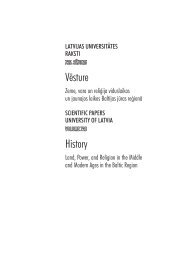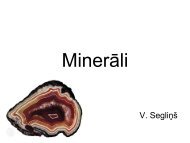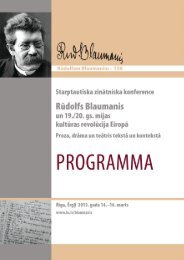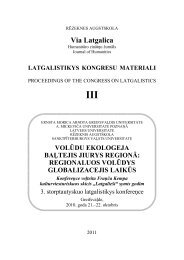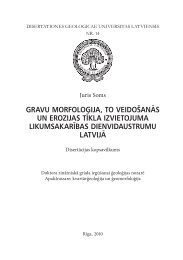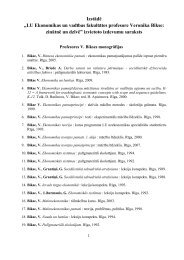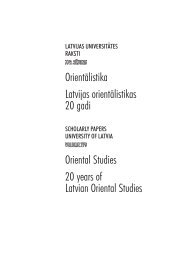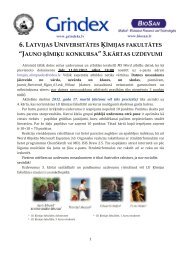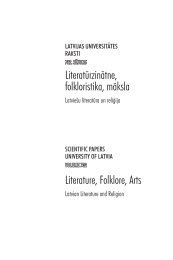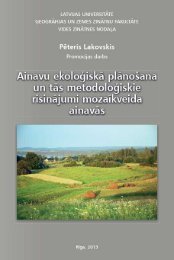Untitled
Untitled
Untitled
Create successful ePaper yourself
Turn your PDF publications into a flip-book with our unique Google optimized e-Paper software.
LATVIJAS UNIVERSITÂTES RAKSTI. 2004. 666. sçj.: LITERATÛRZINÂTNE, FOLKLORISTIKA,<br />
MÂKSLA, 68.–74. lpp.<br />
Homeliness and Loneliness in Afro–German<br />
Women Narratives<br />
Vientulîba un ilgas pçc mâjâm afrovâcu rakstnieèu<br />
literârajos darbos<br />
Aija Poikâne (Latvia–Germany)<br />
Holder of the DAAD scholarship,<br />
University of Dortmund/Germany,<br />
Emil–Figge–Strasse 50, 44227 Dortmund,<br />
e–mail: apoikane@hotmail.com<br />
The term “Afro–Germans” often causes surprise and misunderstanding in the society of<br />
“white” Germans. The notion “Afro–Germans” was introduced at the end of the 20–th century<br />
(in 1984). With it women of African origin who were born in Germany in racially mixed<br />
families wanted to express their protest to racism and discrimination in everyday life. The<br />
main aim of Afro–German women was to create an identity of their own thus avoiding racist<br />
definitions, such as “mulatto”, “coloured” or “bastard” used by the society of “white” Germans.<br />
Speaking about the creation of Afro–German identity and literature, it is important to<br />
note the influence of Afro–American culture and literature. The aim of this work is to analyse<br />
and compare Afro–German and Afro–American literatures as well as to investigate the meaning<br />
of the notion of “home” in both literatures.<br />
Keywords: Afro–German, African Americans, home, boundaries, women literature.<br />
The notion of Afro–German literature may not be familiar to many people inside<br />
and outside of Germany. Cultural and literary initiatives of Afro–Germans that began<br />
in the 1980s arose as a response to the experience of marginalization. Excluded from<br />
the participation in the dominant white German society and perceived as strangers in<br />
their own homeland, Afro–Germans try to define their identity and search for role and<br />
home in German society. In 1984, together with an African American poet, Audre<br />
Lorde, black women living in Germany developed the term “Afro–German” which signified<br />
an affirmation of a double identity and quest for home. The fact that the term<br />
“Afro–German” was developed together with Audre Lorde suggests that African<br />
American literature presided in a sense over the birth of Afro–German identity and<br />
literature.<br />
Therefore, I want to explore the differences and similarities between African<br />
American and Afro–German literatures. My comparative analysis will involve the<br />
texts of Audre Lorde Zami and May Ayim’s poem “schwarz weiss monolog” (“black<br />
white monologue”) as well as the personal history of Ayim, included in the ground<br />
breaking book Farbe bekennen. Afro–deutsche Frauen auf den Spuren ihrer<br />
Geschichte, (Showing Our Colors. Afro–German Women Speak Out) produced in<br />
1986. The main focus of my analysis will be placed on the notion of home for I consider<br />
this category to be one of the most crucial features in African American and<br />
Afro–German texts. This statement, however, requires some explanation. African<br />
slaves, brought to the New World were homeless, therefore black people had a ne-



